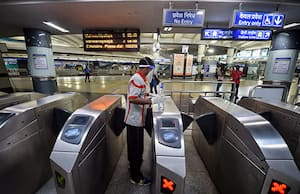Cabinet Approves Rs 19,500-Crore PLI Scheme For Solar PV Modules
The Cabinet has also approved the National Logistics Policy, which aims at reducing transportation cost and promoting seamless movement of goods in the country, Union Minister Anurag Thakur said

The Union Cabinet, chaired by Prime Minister Narendra Modi, on Wednesday approved the Ministry of New & Renewable Energy’s proposal for implementation of the Production Linked Incentive Scheme (Tranche II) on ‘National programme on High Efficiency Solar PV Modules’, with an outlay of Rs 19,500 crore for achieving manufacturing capacity of Giga Watt (Gw) scale in High Efficiency Solar PV Modules, Union Minister Anurag Thakur said.
The national programme on High Efficiency Solar PV Modules aims to build an ecosystem for manufacturing of high efficiency solar PV modules in India, and thus reduce import dependence in the area of Renewable Energy. It will strengthen the Atamnirbhar Bharat initiative and generate employment.
Solar PV manufacturers will be selected through a transparent selection process. PLI will be disbursed for five years after commissioning of solar PV manufacturing plants on sales of high efficiency solar PV modules from the domestic market will be incentivised.
The key benefits expected from the scheme are as follows:
- It is estimated that about 65,000 Mw per annum manufacturing capacity of fully and partially integrated, solar PV modules would be installed.
- The scheme will bring direct investment of around Rs 94,000 crore.
- Creation of manufacturing capacity for Balance of Materials like EVA, Solar glass, Backsheet, etc.
- Direct employment of about 1,95,000 and indirect employment of around 7,80,000 persons.
- Import substitution of approximately Rs1.37 lakh crore.
- Impetus to Research and Development to achieve higher efficiencies in Solar PV Modules.
The Cabinet has also approved the National Logistics Policy (NLP), which aims at reducing transportation cost and promoting seamless movement of goods in the country, Thakur said. Modi last week unveiled the policy which seeks to cut transportation costs by promoting seamless movement of goods across the country.
While launching the policy, the prime minister had said that "from 13-14 per cent (of the GDP), we should all aim to bring the logistics cost to single-digit as soon as possible". The policy lays down an overarching interdisciplinary, cross-sectoral, multi-jurisdictional and comprehensive policy framework for the logistics sector. It is also envisaged to bring efficiency in logistics services and human resources through streamlining processes, regulatory framework, skill development, mainstreaming logistics in higher education and adoption of suitable technologies.
The vision is to develop a technologically enabled, integrated, cost-efficient, resilient, sustainable and trusted logistics ecosystem for accelerated and inclusive growth.






































